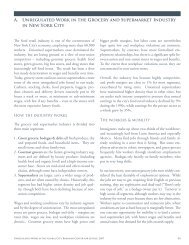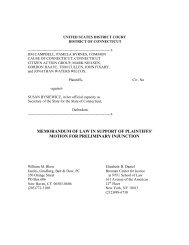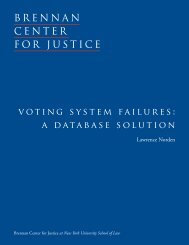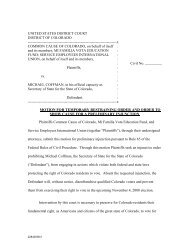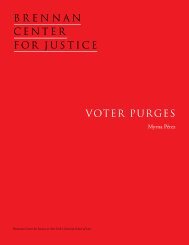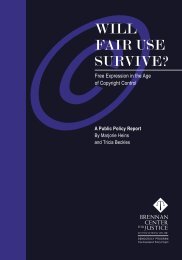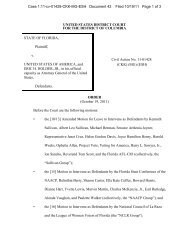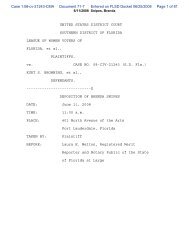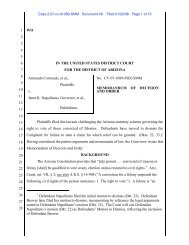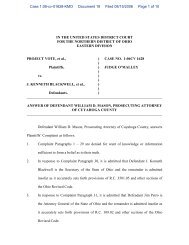Motion to Dismiss - Brennan Center for Justice
Motion to Dismiss - Brennan Center for Justice
Motion to Dismiss - Brennan Center for Justice
Create successful ePaper yourself
Turn your PDF publications into a flip-book with our unique Google optimized e-Paper software.
1234567891011121314151617181920212223242526TERRY GODDARDAt<strong>to</strong>rney GeneralFirm Bar No. 14000Mary O’Grady, No. 011434Solici<strong>to</strong>r GeneralBarbara A. Bailey, No. 018230Assistant At<strong>to</strong>rney General1275 West Washing<strong>to</strong>n StreetPhoenix, Arizona 85007-1298Tel: (602) 542-3333Fax: (602) 542-8308At<strong>to</strong>rneys <strong>for</strong> Defendant Governor Janet NapolitanoIN THE UNITED STATES DISTRICT COURTDISTRICT OF ARIZONAARMANDO CORONADO; JOSEPHRUBIO; MICHAEL GARZA; MICHELECONVIE; and RAYMOND LEWIS, JR.,Plaintiffs,v.JANET K. NAPOLITANO, Governor;JANICE K. BREWER, Secretary of Stateof Arizona, F. ANN RODRIGUEZ, PimaCounty Recorder; and HELEN PURCELL,Maricopa County Recorder, in their officialcapacities,Defendants.No. CV07-01089 PHX SMMMOTION TO DISMISS PURSUANTTO FED. R. CIV. P. 12(B)(6) ANDMEMORANDUM OF POINTS ANDAUTHORITIES IN SUPPORTTHEREOF(Assigned <strong>to</strong> the HonorableStephen M. McNamee)(Oral Argument Requested)Pursuant <strong>to</strong> Fed. R. Civ. P. 12(b)(6), Defendant Governor Janet K. Napolitanomoves <strong>to</strong> dismiss the Complaint and this action with prejudice <strong>for</strong> failure <strong>to</strong> state aclaim upon which relief can be granted. This motion is supported by the followingmemorandum of points and authorities.2728Case 2:07-cv-01089-SMM Document 22 1 Filed 08/13/2007 Page 1 of 18
12345678910111213141516171819202122232425262728MEMORANDUMPreliminary StatementPlaintiffs’ Complaint asks the Court <strong>to</strong> disregard longstanding federal and stateconstitutional law and grant felons the right <strong>to</strong> vote even if they have not completed theterms of their lawfully imposed sentences. The Plaintiffs’ claims are based on twonovel theories: (1) the State discriminates against them on the basis of wealth becausethe State does not res<strong>to</strong>re civil rights <strong>to</strong> felons until they have completed all the terms oftheir sentences, which may include the payment of fines; and (2) the State discriminatesagainst them because they “only” have committed crimes that were not felonies atcommon law.The constitutional sanction of felon disenfranchisement, however, has been wellestablished<strong>for</strong> more than a century. Unlike other rights set out in the Constitution, theright <strong>to</strong> vote is expressly limited as that right pertains <strong>to</strong> individuals who have chosen <strong>to</strong>engage in criminal conduct. Indeed, the Supreme Court established decades ago thatthe Constitution does not require states <strong>to</strong> res<strong>to</strong>re voting rights <strong>to</strong> felons at any time—even if they complete their sentence. Arizona chooses <strong>to</strong> res<strong>to</strong>re such <strong>for</strong>feited rights,but requires in return that a felon complete all the terms of his sentence.Under the reasoning of Supreme Court precedent, there is no equal protectionreview required with regard <strong>to</strong> Plaintiffs’ challenge. Moreover, even if equal protectionconcerns were implicated in the circumstances, Plaintiffs’ Complaint does not (andcannot) overcome the heavy presumption in favor of upholding Arizona’s constitutionaland statu<strong>to</strong>ry provisions on felon disenfranchisement.Neither do the many authorities that have addressed felon disenfranchisementlaws support Plaintiffs’ claim that the type of felony they committed governs whetherthe State may take away their voting rights. Instead, those authorities stand <strong>for</strong> thenotion that states constitutionally may remove the right <strong>to</strong> vote from individuals whoengage in any or all types of felonies. Accordingly, the Court should dismiss Plaintiffs’Complaint.Overview of Arizona’s Felon Disenfranchisement Laws and Relevant AllegationsCase 2:07-cv-01089-SMM Document 22 2 Filed 08/13/2007 Page 2 of 18
12345678910111213141516171819202122232425262728of the ComplaintSince Arizona became a state, its Constitution has limited the right <strong>to</strong> vote ofconvicted felons. The Constitution provides, in part, with regard <strong>to</strong> voter qualifications:“No person who is adjudicated an incapacitated person shall be qualified <strong>to</strong> vote at anyelection, nor shall any person convicted of treason or felony, be qualified <strong>to</strong> vote at anyelection unless res<strong>to</strong>red <strong>to</strong> civil rights.” Ariz. Const. art. VII § 2 (underscoring added).In accordance with that constitutional mandate, the Arizona Revised Statutesprovide that “[a] conviction <strong>for</strong> a felony suspends the following civil rights of theperson sentenced: 1. The right <strong>to</strong> vote.” Ariz. Rev. Stat. (“A.R.S.”) § 13-904(A). 1 InArizona, a person who has been convicted of a single felony au<strong>to</strong>matically regains hiscivil rights if the person both “[c]ompletes a term of probation or receives an absolutedischarge from imprisonment” and “[p]ays any fine or restitution imposed.” A.R.S. §13-912(A). Thus, upon completion of both the imprisonment and payment of financialpenalties imposed as a result of a felon’s criminal conviction, that person’s civil rightsare res<strong>to</strong>red. 2 Those rights include the right <strong>to</strong> vote.For persons who have been convicted of more than one felony, res<strong>to</strong>ration ofcivil rights is not au<strong>to</strong>matic. Such felons must apply <strong>to</strong> the superior court <strong>to</strong> have theircivil rights res<strong>to</strong>red. A.R.S. § 13-905 (setting <strong>for</strong>th the application process <strong>for</strong>res<strong>to</strong>ration of civil rights <strong>for</strong> persons who have completed probation); A.R.S. § 13-906(setting <strong>for</strong>th the application process <strong>for</strong> res<strong>to</strong>ration of civil rights <strong>for</strong> persons who havebeen discharged from prison). The superior court judge by whom the felon wassentenced has discretion whether <strong>to</strong> grant res<strong>to</strong>ration of the felon’s civil rights uponapplication. A.R.S. § 13-908.1 A felony is “an offense <strong>for</strong> which a sentence <strong>to</strong> a term of imprisonment in the cus<strong>to</strong>dyof the state department of corrections is authorized by any law of this state.” A.R.S. §13-105(16).2 The right <strong>to</strong> possess a weapon is not au<strong>to</strong>matically res<strong>to</strong>red, however. A.R.S. § 13-912(B). In addition, under legislation enacted in 2007 the right <strong>to</strong> vote of personsconvicted of counterfeiting election returns is not au<strong>to</strong>matically res<strong>to</strong>red. See 2007 Ariz.Sess. Laws ch. 295, § 5 (amending A.R.S. § 16-1011).Case 2:07-cv-01089-SMM Document 22 3 Filed 08/13/2007 Page 3 of 18
12345678910111213141516171819202122232425262728Arizona courts are authorized <strong>to</strong> impose fines in addition <strong>to</strong>, or in lieu of, prisonterms as sentences <strong>for</strong> felony convictions. See A.R.S. § 13-801. In addition, thesuperior court may order that all or any part of a fine imposed on a convicted felon beallocated as restitution <strong>for</strong> any economic loss that was caused by the felon’s crime.A.R.S. § 13-804. In determining the amount of restitution, the superior court “shall notconsider the economic circumstances of the defendant.” A.R.S. § 13-804(C).According <strong>to</strong> the Complaint, each of the five plaintiffs in this case has beenconvicted of a felony under Arizona law. [Compl. 7-11] Plaintiffs Coronado, Rubioand Garza were sentenced <strong>to</strong> pay fines, probation costs, restitution or some combinationof those costs. [Compl. 7-9] The Complaint alleges that each of those threeplaintiffs was denied res<strong>to</strong>ration of his civil rights based on the failure <strong>to</strong> complete hissentence by paying his outstanding financial obligations that resulted from his felonyconviction. [Id.]Plaintiffs Convie and Lewis were convicted of multiple felonies. [Compl. 10-11] The Complaint does not allege that either Ms. Convie or Mr. Lewis has everapplied <strong>to</strong> obtain res<strong>to</strong>ration of civil rights or that any such application was ever deniedby the superior court.Legal ArgumentI. THE APPLICABLE STANDARD.In deciding a motion <strong>to</strong> dismiss, courts accept all material allegations in thecomplaint as true. McGlinchy v. Shell Chemical Co., 845 F.2d 802, 810 (9 th Cir. 1988).Conclusory allegations of law and unwarranted inferences, however, are insufficient <strong>to</strong>defeat a motion <strong>to</strong> dismiss <strong>for</strong> failure <strong>to</strong> state a claim. E.g., Fields v. Legacy HealthSys., 413 F.3d 943, 951 n.5 (9 th Cir. 2005) (citing Nat’l Ass’n <strong>for</strong> the Advancement ofPsychoanalysis v. Cal. Bd., 228 F.3d 1043, 1049 (9 th Cir. 2000)); McGlinchy, 845 F.2dat 810 (“[C]onclusory allegations without more are insufficient <strong>to</strong> defeat a motion <strong>to</strong>dismiss <strong>for</strong> failure <strong>to</strong> state a claim.”).Moreover, dismissal is warranted if the complaint lacks a cognizable legal theoryor insufficient facts under a cognizable legal claim. SmileCare Dental Group v. DeltaCase 2:07-cv-01089-SMM Document 22 4 Filed 08/13/2007 Page 4 of 18
12345678910111213141516171819202122232425262728Dental Plan of Calif., Inc., 88 F.3d 780, 783 (9 th Cir. 1996); Perry v. Beamer, 933 F.Supp. 556, 557, 559 (E.D. Va.) (dismissing a complaint challenging a felondisenfranchisement law because the legal theories raised by the complaint failed as amatter of law), aff’d, 99 F.3d 1130 (4 th Cir. 1996).II.THE U.S. AND ARIZONA CONSTITUTIONS PERMIT DISENFRANCHISEMENT OFALL FELONS, INCLUDING THOSE WHO HAVE NOT COMPLETED ALL THETERMS OF THEIR SENTENCES.A. The Complaint Fails <strong>to</strong> State an Equal Protection Claim Because theU.S. and Arizona Constitutions Expressly Permit FelonDisenfranchisement.Plaintiffs assert an equal protection violation based on Arizona’s requirementthat felons complete all the terms of their sentences, including the payment of alloutstanding fines and restitution payments, <strong>to</strong> be eligible <strong>to</strong> have their civil rightsres<strong>to</strong>red. [Compl. 56-59] That claim fails as a matter of law, however, because theFourteenth Amendment expressly recognizes states’ rights <strong>to</strong> disenfranchise felons.Moreover, even if a traditional equal protection analysis applies in this case, the claimwould fail because Arizona has a rational basis <strong>for</strong> requiring felons <strong>to</strong> complete all theterms of their criminal sentences be<strong>for</strong>e res<strong>to</strong>ring their civil rights.1. Under Richardson, Arizona is not required <strong>to</strong> res<strong>to</strong>refelons’ civil rights until they complete all the terms oftheir sentence.Arizona’s Constitution expressly provides that “[n]o person who is adjudicatedan incapacitated person shall be qualified <strong>to</strong> vote at any election, nor shall any personconvicted of treason or felony, be qualified <strong>to</strong> vote in any election unless res<strong>to</strong>red <strong>to</strong>civil rights.” Ariz. Const. art. 7 § 2(C). 3 That provision is sanctioned by the U.S.Constitution’s Fourteenth Amendment, which expressly permits states <strong>to</strong> disenfranchisefelons.3Nearly every state in the Union has enacted felon disenfranchisement laws. SeeJohnson v. Florida, 405 F.3d 1214, 1218 (11 th Cir. 2005) (noting that 48 states have suchlaws).Case 2:07-cv-01089-SMM Document 22 5 Filed 08/13/2007 Page 5 of 18
12345678910111213141516171819202122232425262728Specifically, section 2 of the Fourteenth Amendment addresses the right <strong>to</strong> vote<strong>for</strong> certain elec<strong>to</strong>rs, officers and legisla<strong>to</strong>rs. That section imposes on states the penaltyof reduced representation in federal government if such states deny the vote <strong>to</strong> eligibleindividuals “except <strong>for</strong> participation in rebellion, or other crime.” U.S. Const. XIVAmend. § 2 (emphasis added). In Richardson v. Ramirez, the Supreme Courtinterpreted the language of section 2 in deciding a challenge <strong>to</strong> Cali<strong>for</strong>nia’s felondisenfranchisement laws. 418 U.S. 24, 56 (1974).In Richardson, convicted felons sued Cali<strong>for</strong>nia election officials <strong>for</strong> refusing <strong>to</strong>register the plaintiffs <strong>to</strong> vote after the felons had completed their respective criminalsentences. Id. at 26-27. Cali<strong>for</strong>nia’s constitution excluded from voting personsconvicted “of any infamous crime.” Id. at 27. The Court held that felondisenfranchisement laws are not subject <strong>to</strong> the same equal protection analysis as otherstate limitations on the franchise. Id. at 54. Because that same amendment expresslysanctions the disenfranchisement of felons, states may deny felons the right <strong>to</strong> vote ifstates so choose. Id. at 54-56. Moreover, under Richardson, states are not required <strong>to</strong>res<strong>to</strong>re that right at any time, even upon completion of a felon’s sentence. Id. at 56.Under Richardson, Arizona may constitutionally take away felons’ right <strong>to</strong> vote.The fact that Arizona chooses <strong>to</strong> res<strong>to</strong>re felons’ civil rights only after the felon hascompleted all terms of his sentence does not render Arizona’s res<strong>to</strong>ration processunconstitutional.2. Arizona’s civil rights res<strong>to</strong>ration law is constitutionalunder traditional equal protection analysis because it issupported by a rational basis.Even if a traditional equal protection analysis applies <strong>to</strong> Arizona’s civil rightsres<strong>to</strong>ration process, Plaintiffs’ Complaint does not state an equal protection claim.Plaintiffs do not (and cannot) allege that they are members of any protected class. E.g.,United States v. Hancock, 231 F.3d 557, 565 (9 th Cir. 2000) (recognizing that thedefendant who was a multiple misdemeanor convict was not a member of a protectedclass <strong>for</strong> purposes of an equal protection challenge). Neither is there any fundamentalCase 2:07-cv-01089-SMM Document 22 6 Filed 08/13/2007 Page 6 of 18
12345678910111213141516171819202122232425262728right implicated by Arizona’s civil rights res<strong>to</strong>ration process. Although the right <strong>to</strong>vote is fundamental <strong>to</strong> citizens, felons do not have any right <strong>to</strong> vote—fundamental orotherwise. Richardson, 418 U.S. at 56; see also Madison v. Washing<strong>to</strong>n, No. 78598-8,___ P.3d ___, 2007 WL 2128346, at *8-9 (Wash. July 26, 2007) (holding that underRichardson, felons do not have a fundamental right <strong>to</strong> vote and applying rational basisreview <strong>to</strong> felon disenfranchisement law).Thus, Arizona’s law must be upheld as long as it is rationally related <strong>to</strong> alegitimate government interest. E.g., Hancock, 231 F.3d at 566 (where a law neitherimplicates a fundamental right nor targets a suspect class, courts apply a rational basisreview in deciding equal protection challenges); Fields v. Palmdale Sch. Dist., 427 F.3d1197, 1208 (9 th Cir. 2005) (“government actions that do not affect fundamental rightsor liberty interests and do not involve suspect classifications will be upheld if . . . theyare rationally related <strong>to</strong> a legitimate state interest”). In addition, a “classificationneither involving fundamental rights nor proceeding along suspect lines is accorded astrong presumption of validity.” Heller v. Doe, 509 U.S. 312, 319 (1993). Moreover,the person attacking the validity of the law has the burden “<strong>to</strong> negative everyconceivable basis which might support it.” Id. at 320 (internal quotation marksomitted).Arizona’s law regarding res<strong>to</strong>ration of civil rights classifies felons in<strong>to</strong> twogroups: those who complete their criminal sentences and those who do not. TheComplaint does not allege that Arizona has no legitimate interest in having felonscomplete all the terms of their sentences, including the payment of any financialpenalties. Plaintiffs made a conscious decision <strong>to</strong> engage in felonious conduct,knowing that conviction <strong>for</strong> such crimes would result in the loss of some of their civilrights, including the right <strong>to</strong> vote. At the time Plaintiffs chose <strong>to</strong> commit felonies, theyknew that Arizona could sentence them <strong>to</strong> pay fines <strong>for</strong> their conduct and restitution <strong>for</strong>the economic losses directly caused by their conduct <strong>to</strong> their victims. They also knewthat be<strong>for</strong>e they could ever have their civil rights res<strong>to</strong>red, they would have <strong>to</strong> completeall the terms of their sentences, whatever those sentences would be under Arizona law.Case 2:07-cv-01089-SMM Document 22 7 Filed 08/13/2007 Page 7 of 18
12345678910111213141516171819202122232425262728Arizona’s Legislature long ago made a policy choice about the financialpenalties that may be imposed as a result of a felony conviction. Similarly, the peopleof Arizona, in adopting the Victims Bill of Rights, made a policy choice that personsconvicted of crimes—not their victims—should pay <strong>for</strong> the economic losses directlycaused by that criminal conduct. See Ariz. Const. art. 2 § 2.1(8). Requiring personswho nonetheless choose <strong>to</strong> engage in that conduct <strong>to</strong> complete all of their sentencebe<strong>for</strong>e res<strong>to</strong>ring their civil rights is rationally related <strong>to</strong> Arizona’s interest in deterringcrime, punishing crime, and compensating societal victims of their crime. E.g.,Madison, 2007 WL 2128346, at *12 (“The State clearly has an interest in ensuring thatfelons complete all of the terms of their sentence, and there is no requirement that theState res<strong>to</strong>re voting rights <strong>to</strong> felons until they do so.”).Moreover, states have a legitimate interest in regulating the franchise, includingdetermining the qualifications of voters. E.g., Richardson, 418 U.S. at 53 (noting thatstates may consider a person’s criminal record in determining voter qualifications);Green v. Bd. of Elections of the City of New York, 380 F.2d 445, 451-52 (2d Cir. 1967)(discussing the his<strong>to</strong>rical justifications <strong>for</strong> disenfranchising criminals); Madison, 2007WL 2128346, at *12 (states have an interest “in limiting political participation of thoseunwilling <strong>to</strong> abide by laws and in requiring the completion of all sentence elementsbe<strong>for</strong>e the right <strong>to</strong> vote is res<strong>to</strong>red”).Under Richardson, felons have no right <strong>to</strong> vote if the state chooses <strong>to</strong> removethat right. Accordingly, there can be no equal protection problem with Arizona’spolicy decision <strong>to</strong> require felons <strong>to</strong> complete their sentences be<strong>for</strong>e res<strong>to</strong>ring their civilrights. Moreover, even if an equal protection claim was viable, it fails here becauseArizona plainly has a legitimate interest served by its civil rights res<strong>to</strong>ration process.Accordingly, the Court should dismiss Plaintiffs’ equal protection claim based on thefailure <strong>to</strong> pay financial penalties.B. Arizona’s Civil Rights Res<strong>to</strong>ration Law Is Not a Poll Tax.Plaintiffs assert that Arizona’s civil rights res<strong>to</strong>ration process amounts <strong>to</strong> a polltax prohibited by the Twenty-Fourth Amendment and the Voting Rights Act, 42 U.S.C.Case 2:07-cv-01089-SMM Document 22 8 Filed 08/13/2007 Page 8 of 18
12345678910111213141516171819202122232425262728§ 1973h. [Compl. 60-64] The Twenty-Fourth Amendment provides that the right <strong>to</strong>vote in federal elections “shall not be denied or abridged by the United States or anyState by reason of failure <strong>to</strong> pay any poll tax or other tax.” U.S. Const. XXIV Amend.§ 1. That Amendment “was passed in order <strong>to</strong> combat the ‘disenfranchisement of thepoor[,]’ which was the intention of the early poll taxes.” Gonzalez v. Arizona, 485 F.3d1041, 1049 (9 th Cir. 2007) (quoting Harman v. Forssenius, 380 U.S. 528, 539 (1965)).There is no allegation, much less any evidence, that Arizona’s requirement thatfelons complete their sentences <strong>to</strong> have their civil rights res<strong>to</strong>red was or is intended <strong>to</strong>impose a tax on the right <strong>to</strong> vote. Plaintiffs’ poll tax claim fails <strong>for</strong> at least two reasons.First, because felons have no right <strong>to</strong> vote, requiring them <strong>to</strong> complete all the terms oftheir sentences, including payment of imposed financial penalties, cannot be a tax onthat right. In other words, a right must exist be<strong>for</strong>e it can be abridged or denied. E.g.,Harman, 380 U.S. at 541 (<strong>to</strong> demonstrate invalidity of Virginia’s voting restriction, “itneed only be shown that it imposes a material requirement solely upon those whorefuse <strong>to</strong> surrender their constitutional right <strong>to</strong> vote in federal elections without paying apoll tax”); see also Madison, 2007 WL at *10 (distinguishing the poll tax foundunconstitutional in Harper v. Va. State Bd. of Elections, 383 U.S. 663 (1966), andstating that “[c]onvicted felons, on the other hand, no longer possess that fundamentalright as a direct result of their decisions <strong>to</strong> commit a felony”).Second, Arizona’s civil rights res<strong>to</strong>ration law does not make affluence or thepayment of any fee an elec<strong>to</strong>ral standard. E.g., Harper, 383 U.S. at 666 (The EqualProtection Clause is violated “whenever it makes the affluence of the voter or paymen<strong>to</strong>f any fee an elec<strong>to</strong>ral standard”). In the seminal poll taxes cases, the Supreme Courtstruck down state laws that required every person in the state <strong>to</strong> pay a fee as condition<strong>to</strong> voting. Harper, 383 U.S. at 664; Harman, 380 U.S. at 528. By contrast, Arizonadoes not require persons who otherwise are eligible <strong>to</strong> vote <strong>to</strong> pay any fee <strong>to</strong> vote.Arizona chooses <strong>to</strong> res<strong>to</strong>re civil rights that properly had been stripped from personswho committed a felony upon completion of those persons’ criminal sentence. Afinancial cost <strong>to</strong> a felon associated with his crime <strong>to</strong> attain his <strong>for</strong>feited civil rights doesCase 2:07-cv-01089-SMM Document 22 9 Filed 08/13/2007 Page 9 of 18
12345678910111213141516171819202122not amount <strong>to</strong> a tax on the right <strong>to</strong> vote. Cf. Gonzalez, 485 F.3d at 1048-49 (rejectingpoll tax claim based on incidental costs that voter identification requirement wouldhave on voting; the challenged law did not make the payment of fee an elec<strong>to</strong>ralstandard).C. Arizona’s Felon Disenfranchisement Law Does Not Violate the Freeand Equal Elections Clause of the Arizona Constitution.The Free and Equal Elections Clause of the Arizona Constitution provides, “Allelections shall be free and equal, and no power, civil or military, shall at any timeinterfere <strong>to</strong> prevent the free exercise of the right of suffrage.” Ariz. Const. art. 2 § 21.That provision, however, must be read harmoniously and consistently with otherconstitutional provisions. E.g., Arizona v. Jordan, 104 Ariz. 193, 196, 450 P.2d 383,386 (1969) (courts have a duty <strong>to</strong> harmonize separate constitutional provisions “so thatthe constitution is a consistent workable whole”).Arizona’s Constitution expressly excludes from the franchise “any personconvicted of treason or felony,” unless that person has been “res<strong>to</strong>red <strong>to</strong> civil rights.”Ariz. Const. art. 7 § 2(C). Those two provisions easily can be read in harmony <strong>to</strong>guarantee the free exercise of the right <strong>to</strong> vote <strong>for</strong> such persons who have such a right,and <strong>to</strong> exclude felons from those persons who have such a right.The Free and Equal Elections provision necessarily presumes that the right <strong>to</strong>vote exists in the first place. Because felons do not have the right <strong>to</strong> vote under theArizona Constitution, requiring them <strong>to</strong> complete their sentence, including the paymen<strong>to</strong>f financial penalties, does not violate the Free and Equal Elections Clause.232425262728Case 2:07-cv-01089-SMM Document 22 10 Filed 08/13/2007 Page 10 of 18
12345678910111213141516171819202122232425262728D. Arizona’s Felon Disenfranchisement Law Does Not Violate thePrivileges and Immunities Clauses of the Arizona and U.S.Constitutions.1. The Arizona equal privileges and immunities clause.Arizona’s equal privileges and immunities (i.e., equal protection) clauseprovides, “No law shall be enacted granting <strong>to</strong> any citizen, class of citizens, orcorporation other than municipal, privileges or immunities which, upon the same terms,shall not equally belong <strong>to</strong> all citizens or corporations.” Ariz. Const. art. 2 § 13.Plaintiffs do not identify any law that grants <strong>to</strong> any citizen or class of citizensany privilege which does not, on the same terms, belong <strong>to</strong> all citizens. The “privilege”about which Plaintiffs complain is the right <strong>to</strong> vote. That right has not been granted <strong>to</strong>citizens on different terms. Instead, the right is granted <strong>to</strong> all, with the qualification(upheld by Richards) that certain classes of citizens, including felons, may be excluded.Stated another way, Plaintiffs are not similarly situated <strong>to</strong> citizens who are qualified <strong>to</strong>vote. E.g., Stults Eagle Drug Co., v. Luke, 48 Ariz. 467, 475, 62 P.2d 1126, 1130(Ariz. 1936) (privileges and immunities provision secures equality of opportunity “<strong>to</strong>all persons and corporations similarly situated, and that is all that said constitutionalprovision undertakes <strong>to</strong> guarantee”); Lindsay v. Cave Creek Outfitters, L.L.C., 207Ariz. 487, 494, 88 P.3d 557, 564 (App. 2003) (Arizona privileges and immunitiesprovision does not proscribe all unequal treatment, but rather it requires only the equaltreatment of persons similarly situated in a given class).Moreover, among similarly situated felons, Arizona’s law does not treatmembers of the class differently. Arizona requires all felons <strong>to</strong> complete all the termsof their sentences, including payment of financial penalties. See A.R.S. §§ 13-912(A), --905, -906. The fact that some felons’ own conduct results in financial penalties as par<strong>to</strong>f their sentence does not trans<strong>for</strong>m the civil rights res<strong>to</strong>ration law in<strong>to</strong> one imposingunequal treatment on members of the felon class.In Madison v. Washing<strong>to</strong>n, the Washing<strong>to</strong>n Supreme Court interpreted aprovision in that State’s constitution that is substantively identical <strong>to</strong> Arizona’sCase 2:07-cv-01089-SMM Document 22 11 Filed 08/13/2007 Page 11 of 18
12345678910111213141516171819202122232425262728privileges and immunities provision. The court noted that the concerns of favoritism<strong>to</strong>ward the wealthy, which were a basis <strong>for</strong> the constitutional provision, were “nottriggered by Washing<strong>to</strong>n’s felon disenfranchisement scheme because it grants the‘privilege’ of res<strong>to</strong>ration of voting rights ‘upon the same terms . . . equally . . . <strong>to</strong> allcitizens.’” Madison, 2007 WL 2128346, at *6. The court stated:Id.Additionally, the Washing<strong>to</strong>n Constitution disqualifies voters on equalterms-that is, when individuals have been convicted of committing afelony. Finally, Washing<strong>to</strong>n’s statu<strong>to</strong>ry disenfranchisement schemeprovides <strong>for</strong> the res<strong>to</strong>ration of voting rights <strong>to</strong> felons on equal terms—thatis, only after individuals have satisfied all of the terms of their sentences.If those terms include payment of [legal financial obligations], then thefull payment of [those obligations] is one of the prerequisites <strong>to</strong>res<strong>to</strong>ration of voting rights. The system of only res<strong>to</strong>ring voting rights <strong>to</strong>felons who have satisfied all of the terms of their sentences, includingfully paying their [financial obligations], does not constitute a grant offavoritism or a granting of a privilege on unequal terms, in violation ofarticle I, section 12, because the same standard is applied evenly <strong>to</strong> allfelons seeking res<strong>to</strong>ration of their voting rights.Even if Arizona’s law could be viewed as treating members of the same classdifferently, that law must be upheld under a rational basis review. Arizona appellatecourts construe the privileges and immunities constitutional provision <strong>to</strong> have the sameeffect as the federal Equal Protection Clause. E.g., Ariz. v. Bonnewell, 196 Ariz. 592,596, 2 P.3d 682, 686 (App. 1999) (stating that the effects of the Arizona Constitutionart. 2 § 13 and the Fourteenth Amendment of the U.S. Constitution “are essentially thesame”). Arizona courts similarly apply rational basis review <strong>to</strong> privileges andimmunities challenges where a statute does not impact a fundamental right or a suspectclass. E.g., id. (“Because the statute implicates neither a fundamental right nor asuspect class, we apply a rational basis test.”); Ariz. Downs v. Ariz. Horsemen’s Found.,130 Ariz. 550, 555, 637 P.2d 1053, 1058 (Ariz. 1981) (where a “statute does not impactupon a fundamental right or a suspect class, the statute will be upheld if it has anyconceivable rational basis <strong>to</strong> further a legitimate governmental interest”).As explained above in section II.A.2, Arizona’s civil rights res<strong>to</strong>ration law isCase 2:07-cv-01089-SMM Document 22 12 Filed 08/13/2007 Page 12 of 18
12345678910111213141516171819202122232425262728rationally related <strong>to</strong> Arizona’s interest in deterring crime, punishing crime, andcompensating societal victims of their crime.2. The Federal Privileges and Immunities Clause.Plaintiffs’ claim based on the federal privileges and immunities provision of theFourteenth Amendment should be dismissed because, as explained above in sectionII.A.1, section 2 of that amendment expressly permits the disenfranchisement of felons.Although Richardson addressed the equal protection language of section 1 of thatamendment, the Court’s reasoning applies with equal <strong>for</strong>ce <strong>to</strong> any privileges andimmunities argument based on that same constitutional section. See, e.g., Richardson,418 U.S. at 43 (adopting the state’s argument that “those who framed and adopted theFourteenth Amendment could not have intended <strong>to</strong> prohibit outright in § 1 of thatAmendment that which was expressly exempted from the lesser sanction of reducedrepresentation imposed by § 2 of the Amendment”).III.THE COURT SHOULD DISMISS ALL CLAIMS BASED UPON THE TYPE OFFELONIES OF WHICH PLAINTIFFS WERE CONVICTED.A. There Is No Equal Protection Claim Based on the Type of FelonyCommitted by Plaintiffs.Each of Plaintiffs’ three remaining claims (Counts 5-7) is based on the mistakenassertion that crimes that were not deemed felonies at common law may not provide aconstitutional basis <strong>for</strong> disenfranchisement. [See Compl. 43-44, 74-76, 79, 83]Plaintiffs assert that the language used in nineteenth century federal legislation,including the Reconstruction Act of 1867 and various confederate state readmissionacts, establishes that the Fourteenth Amendment authorizes disenfranchisement ofindividuals convicted only of crimes that were felonies at common law. [See id. 36-42]The Fourteenth Amendment, however, contains no such limiting language. Asexplained previously, section 2 of that amendment reduced states’ representation in thefederal government <strong>to</strong> the extent such states denied the vote <strong>to</strong> eligible individuals“except <strong>for</strong> participation in rebellion, or other crime.” U.S. Const. XIV Amend. § 2.Case 2:07-cv-01089-SMM Document 22 13 Filed 08/13/2007 Page 13 of 18
12345678910111213141516171819202122232425262728That amendment does not limit the disenfranchisement <strong>to</strong> individuals convicted offelonies at common law. Under Richardson, that provision permits states <strong>to</strong> take awaythe rights of all felons <strong>to</strong> vote. The Richardson court did not distinguish between thetypes of felonies committed by the plaintiffs in that case. Indeed, one of the felonschallenging Cali<strong>for</strong>nia’s disenfranchisement law had been convicted of the “noncommon law felony” of drug possession. 418 U.S. at 32 n.9. Thus, neither the plainlanguage of the Constitution nor the reasoning or language of Richardson supportsPlaintiffs’ argument that the type of felony committed determines whether the felonmay be disenfranchised.Moreover, other courts consistently have upheld felon disenfranchisement lawswithout distinguishing among the particular crimes that gave rise <strong>to</strong> thedisenfranchisement. E.g., Perry v. Beamer, 933 F. Supp. 556, 559-60 (E.D. Va.)(rejecting the notion that the type of felony—common law or non common law—determines whether the state could disenfranchise felons: “The Supreme Court,however, apparently gave no import <strong>to</strong> this distinction, and this Court shall do thesame.”), aff’d, 99 F.3d 1130 (4 th Cir. 1996); Fincher v. Scott, 352 F. Supp. 117, 118(M.D.N.C. 1972) (upholding against an equal protection challenge a North Carolinadisenfranchisement law that excluded all persons convicted “of any crime thepunishment <strong>for</strong> which now or may hereafter be imprisonment in the State’s prison”),aff’d, 411 U.S. 961 (1973); Beacham v. Braterman, 300 F. Supp. 182, 183-84 (S.D.Fla.) (upholding a Florida law that excluded from the franchise all persons convicted“of any felony by any court of record and whose civil rights have not been res<strong>to</strong>red”),aff’d, 396 U.S. 12 (1969); cf. Merritt v. Jones, 533 S.W.2d 497, 500-01 (Ark. 1976)(rejecting felon’s argument that Arkansas constitutional disenfranchisement provisionexcluding persons “convicted of felonies” applied only <strong>to</strong> felonies at common law; theword felonies “is plain and unambiguous” and court would apply its commonmeaning).One federal appellate court upheld against an equal protection challenge a SouthCarolina disenfranchisement law which excluded all persons who had been convictedCase 2:07-cv-01089-SMM Document 22 14 Filed 08/13/2007 Page 14 of 18
12345678910111213141516171819202122232425262728of any one of an enumerated list of crimes. Allen v. Ellisor, 664 F.2d 391, 392, 397-98(4 th Cir.), vacated on other grounds, 454 U.S. 807 (1981). The plaintiffs in Allenasserted that equal protection review was appropriate where the state law “identif[ied]the disqualifying crimes specifically, thus including some crimes as disqualifying andomitting others.” Id. at 396. Although the plaintiffs’ challenge was not based on adistinction between common law and non common law felonies, the court’s decisionand extensive discussion of precedent on felon disenfranchisement leave no room <strong>for</strong>such a distinction.The court noted that none of the Supreme Court’s decisions addressing equalprotection outside of the felon disenfranchisement context suggests “that the states arewithout power <strong>to</strong> continue their his<strong>to</strong>ric exclusion from the franchise of personsconvicted of all or certain types of felonies.” Id. at 393 (emphasis added). The courtconcluded that section 2 of the Fourteenth Amendment “immunizes any classificationof disqualifying crimes, whether the classification is stated in terms of ‘felonies’generally, or of some felonies, or of certain specified crimes.” Id. at 397-98. Althoughthe Supreme Court ultimately vacated the Fourth Circuit’s decision in Allen, the Courtdid so on grounds of mootness following the amendment of the South Carolina law atissue. See Allen v. Ellisor, 454 U.S. 807 (1981). The South Carolina legislatureamended the law <strong>to</strong> eliminate the designation of certain felonies and <strong>to</strong> disqualify allpersons “serving a term of imprisonment resulting from a conviction of a crime.” SeeS.C. Code § 7-5-120 (1976).Neither the Fourteenth Amendment nor the authorities addressing felondisenfranchisement laws supports Plaintiffs’ claims based on an irrelevant distinction inthe type of felonies they committed. Accordingly, the Court should dismiss Plaintiffs’equal protection claim asserted under Count Five.B. The Type of Felony Committed by Plaintiffs Does Not Provide aBasis <strong>for</strong> a Claim under the Free and Equal Elections Clause.Arizona’s Constitution expressly excludes from the franchise all personsconvicted of a felony. Ariz. Const. art. 7 § 2(C). As explained in section II.C above,Case 2:07-cv-01089-SMM Document 22 15 Filed 08/13/2007 Page 15 of 18
12345678910111213141516171819202122232425262728that provision can (and must) be read in harmony with Arizona’s Free and EqualElections provision. There is no basis <strong>for</strong> distinguishing among the particular offensesthat have been defined as felonies by the Legislature <strong>for</strong> purposes of Arizona’s felondisenfranchisement provision.The word “felony” in Arizona’s felony disenfranchisement provision (art. 7 § 2)must be given the meaning that is generally unders<strong>to</strong>od <strong>to</strong> define that term. E.g.,McElhaney Cattle Co. v. Smith, 132 Ariz. 286, 290, 645 P.2d 801, 805 (Ariz. 1982)(“When the words of a constitutional provision are not defined within it, the meaning <strong>to</strong>be ascribed <strong>to</strong> the words is that which is generally unders<strong>to</strong>od and used by thepeople.”); Ariz. Minority Coalition <strong>for</strong> Fair Redistricting v. Ariz. Indep. RedistrictingComm’n, 211 Ariz. 337, 352, 121 P.3d 843, 858 (App. 2005) (in interpreting theArizona Constitution, stating that the court will not go beyond the plain language of theprovision unless the language is unclear and that “we give words their natural, obviousand ordinary meaning unless defined otherwise in the constitution”), review denied(Jan. 4, 2006). The Arizona legislature has defined “felony” <strong>to</strong> mean “an offense <strong>for</strong>which a sentence <strong>to</strong> a term of imprisonment in the cus<strong>to</strong>dy of the state department ofcorrections is authorized by any law of this state.” A.R.S. § 13-105(16). 4The drafters of article 7, section 2(C) of Arizona Constitution easily could havechosen <strong>to</strong> qualify “felony” with the phrase “at common law.” They did not. There isno basis <strong>for</strong> ignoring the provision’s plain language in favor of distinguishing amongfelony types <strong>for</strong> purposes of construing Arizona’s Free and Equal Elections Clause.Accordingly, Plaintiffs’ claim based on that distinction as asserted in Count Six shouldbe dismissed. 54The legislative definition of felony largely has remained the same throughout theState’s his<strong>to</strong>ry. See, e.g., Rev. Stat. of Ariz. Penal Code § 17 (1913) (defining felony as“a crime which is punishable with death or by imprisonment in the state prison”).5The framers’ omission of the limiting words “at common law” in the felondisenfranchisement provision is most sensible given the policy considerations underlyingsuch disenfranchisement. “[I]t can scarcely be deemed unreasonable <strong>for</strong> a state <strong>to</strong> decidethat perpetra<strong>to</strong>rs of serious crimes shall not take part in electing the legisla<strong>to</strong>rs who makeCase 2:07-cv-01089-SMM Document 22 16 Filed 08/13/2007 Page 16 of 18
12345678910111213141516171819C. The Type of Felony Committed by Plaintiffs Does Not Provide aBasis <strong>for</strong> a Claim under the Privileges and Immunities Clause.Plaintiffs’ claim asserted under Count Seven presumably is based on the notionthat the privileges and immunities provisions of the Arizona and U.S. Constitutions donot permit disenfranchisement of persons convicted only of non common law felons.[See Compl. 83] As explained above in section III.A, however, the FourteenthAmendment, as interpreted by the many cases cited, draws no such distinction.Because states may constitutionally disenfranchise individuals convicted of any or allfelonies, Plaintiffs’ claim based upon the respective privileges and immunitiesprovisions lack support in the law. Accordingly, Count Seven should be dismissed.prejudice.Relief RequestedFor the <strong>for</strong>egoing reasons, the Court should dismiss the Complaint withDATED this 13th day of August, 2007.TERRY GODDARDArizona At<strong>to</strong>rney General/s Mary O’GradyMary O’Grady, Solici<strong>to</strong>r GeneralBarbara A. Bailey, Assistant At<strong>to</strong>rney GeneralAt<strong>to</strong>rneys <strong>for</strong> Governor Janet Napolitano202122232425262728the laws, the executives who en<strong>for</strong>ce these, the prosecu<strong>to</strong>rs who must try them <strong>for</strong> furtherviolations, or the judges who are <strong>to</strong> consider their cases.” Green, 380 F.2d at 451. Thesame policy notions that underlie the longstanding his<strong>to</strong>ry of felon disenfranchisementapply with equal <strong>for</strong>ce <strong>to</strong> “non common law” felonies.Case 2:07-cv-01089-SMM Document 22 17 Filed 08/13/2007 Page 17 of 18
12345678910111213141516171819202122232425262728CERTIFICATE OF SERVICEI hereby certify that on the 13th day of August, 2007, I caused the <strong>for</strong>egoingdocument <strong>to</strong> be electronically transmitted <strong>to</strong> the Clerk’s Office using the CM/ECFSystem <strong>for</strong> filing and transmittal of a Notice of Electronic Filing <strong>to</strong> the followingCM/ECF Registrants:Laughlin McDonaldNeil BradleyNancy G. AbuduAmerican Civil Liberties UnionVoting Rights Project2600 Marquis One Tower245 Peachtree <strong>Center</strong> Ave., NEAtlanta, GA 30303-1227lmcdonald@aclu.orgnbradley@aclu.orgnabudu@aclu.orgAt<strong>to</strong>rneys <strong>for</strong> PlaintiffsDaniel PochodaLegal Direc<strong>to</strong>rAmerican Civil Liberties UnionFoundation of ArizonaPO Box 17148Phoenix, AZ 85011-0148dpochoda@acluaz.orgAt<strong>to</strong>rneys <strong>for</strong> PlaintiffsCOPY of the <strong>for</strong>egoing mailed with Notice ofElectronic Filing this 13th day of August, 2007 <strong>to</strong>:The Honorable Stephen M. McNameeUnited States District CourtSandra Day O’Connor U.S. Courthouse, Suite 624401 West Washing<strong>to</strong>n Street, SPC 59Phoenix, AZ 85003-215815344/s Elizabeth A. StarkCase 2:07-cv-01089-SMM Document 22 18 Filed 08/13/2007 Page 18 of 18


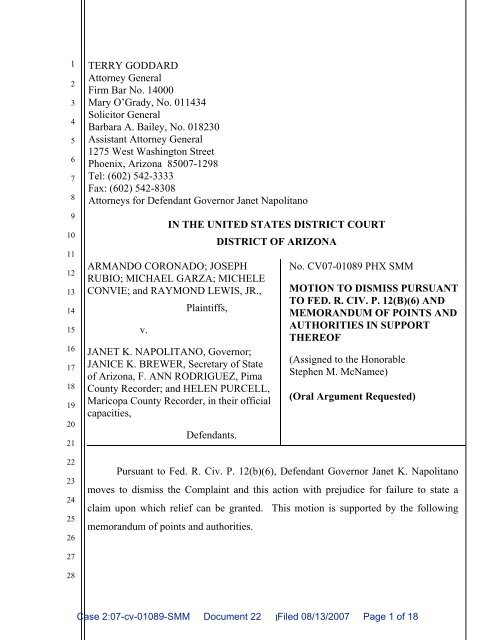

![Download the Letter [PDF] - Brennan Center for Justice](https://img.yumpu.com/50139248/1/190x245/download-the-letter-pdf-brennan-center-for-justice.jpg?quality=85)
